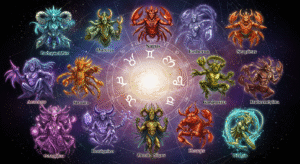Hello dear readers!
Today we’re taking a closer look at astrology that everyday entertainment we can’t seem to give up.
Astrology claims that the alignment of planets at our birth shapes our character and destiny. In this article, we’ll explore why this ancient practice still fascinates millions, and we’ll critique it through scientific, psychological, and philosophical lenses.
The goal is not to dismiss astrology entirely, but to understand it and maybe discover why it remains so popular.
Ready? Let’s begin.
Introduction: “The Planets Aligned, So What?”
“This month we’ll face communication mishaps because Mercury is retrograde.”
“Next week money opportunities will knock on our door because Venus is in a favorable aspect.”
They say the alignment of the sky at our birth determines our character and destiny.
Sound familiar?
But let’s ask:
Are planetary orbits precise and machine-like enough to govern our lives one by one or do we project our fear of uncertainty onto the sky?
1) A Short Background: What Does Astrology Promise?
Astrology interprets the positions of the Sun, Moon, rising sign, planets, and their aspects at the moment of birth to explain personality traits and life events.
In popular terms: “The planets aligned,” “this month is lucky,” “this day is retrograde.”
The promise is simple: “Your chart is your map.”
The appeal is even simpler: It offers a frame for the unknown.
2) The Barnum Effect: Why Does It Feel “So Accurate”?
In psychology, the Barnum effect (or Forer effect) describes how people interpret vague, general statements as highly personal and accurate.
Micro test:
“Sometimes you’re introverted, but in the right setting you’re outgoing.”
“People sometimes misunderstand you, yet your intentions are often good.”
“When you trust, you are generous; when hurt, you withdraw.”
Which of these does not fit you?
Answer: All of them fit everyone.
That’s why weekly horoscopes work: They’re written to fit anyone, balancing vagueness with just enough positivity or caution.
Add confirmation bias, and suddenly we say: “See, it came true!”
3) The Psychology Side: We Seek Security, Not Stars
The human mind hates uncertainty. When the future feels unpredictable, anxiety rises. Astrology’s popularity often rests on three psychological needs:
Illusion of control: Frame = relief. “If I’m prepared, nothing bad will happen.”
Self identity: Label = identity. “I’m this way because I’m a Leo.”
 Social convenience: Quick excuses for compatibility. “Our rising signs clash, so we don’t get along.”
Social convenience: Quick excuses for compatibility. “Our rising signs clash, so we don’t get along.”
Here, Jung comes into play but not treating astrology as a physical cause, rather as a symbolic language.
Jung wrote of the collective unconscious producing archetypes:
Mars = war/energy
Venus = attraction/relationships
Saturn = boundaries/discipline
These are not cosmic forces but ancient symbols of the human mind.
It’s not that the planets push us, but that we project our inner meanings onto the sky.
Jung’s concept of synchronicity echoes this: not causation, but meaningful coincidence. Humans tend to read outer order through the inner map of their psyche.
4) Philosophical Weigh In: Fate or Belief?
Here lies a metaphysical question:
If a claim can explain any outcome after the fact, is it knowledge or is it belief?
“It happened because your chart said so.”
“It didn’t happen because the transit wasn’t right.”
“It happened, but Saturn made you pay the price.”
Such reasoning explains everything thus it becomes unfalsifiable.
In philosophy, this means it ceases to be science and becomes a belief system.
To put it plainly:
If horoscopes speak generally, everyone relates: Barnum effect at work.
If they speak specifically, then let’s take the risk: testable, measurable, falsifiable hypotheses. Most popular astrology avoids this.
5) Light Mockery, Heavy Truth: “Mercury Retrograde But What About Your Conscience?”
Astrology can be fun in social settings, a poetic legacy of ancient cultures. But in modern life, “My project failed because Mercury was retrograde” often serves as a neat way of dodging responsibility.
Flip the questions:
“Why did you procrastinate when Mercury was direct?”
“Why didn’t you choose love when Venus was in aspect?”
“Why didn’t you study when Saturn was ‘testing’ you?”
We invoke the stars as excuses more often than we bring willpower and ethics into the equation.
6) Logic Games: What If We Shuffle the Labels?
A simple experiment: Give the same horoscope text to two groups, labeling it Aries for one and Pisces for the other. If both groups say “this fits me perfectly,” the independence of the label is exposed.
Take it further: What if tomorrow we randomly renamed all zodiac signs? Within two weeks, people would still insist their new sign describes them.
Why? Because what creates resonance isn’t the geometry of the heavens, but the elasticity of language, selective memory, and bias of the mind.
Conclusion: The Striking Sentence
The stars don’t govern you; you’re governed by the meaning you project onto them.
You don’t have to discard astrology entirely. But if you read it as psychology and symbolism not physics the spell breaks, and free will begins.
Perhaps the most honest line is this:
We don’t cling to horoscopes; we cling to the comfort of belief.
And the day we give up comfort for responsibility, we’ll see that what we called fate was largely choice.
Questions to Spark Debate:
Can astrology survive if it presents falsifiable hypotheses?
If horoscopes still feel true when we shuffle the labels, is the truth in the sky or in the mind?
If the universe is speaking through the stars, why do reason and ethics shout louder first?
So, what do you think?
Do you believe in horoscopes?